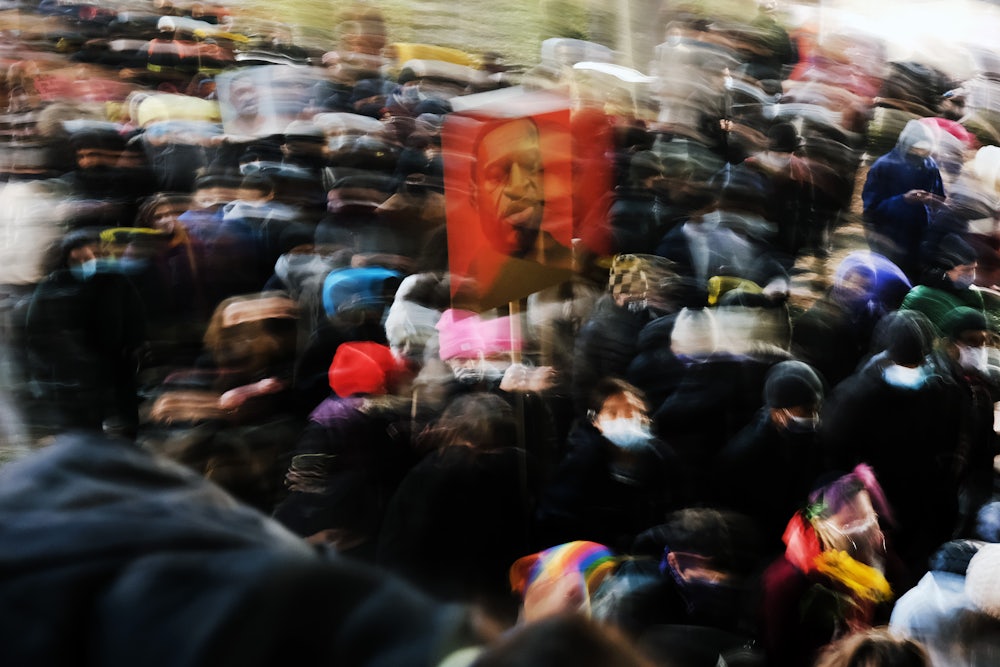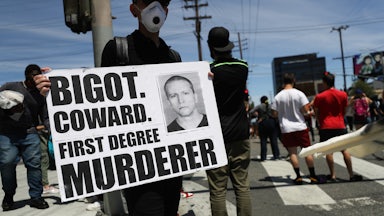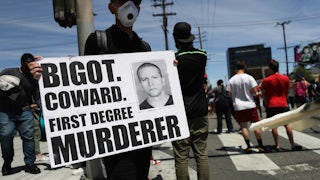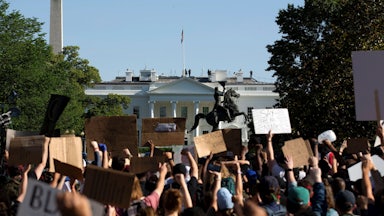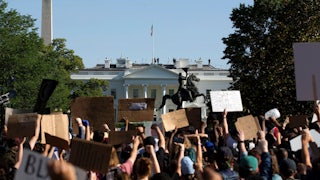Before lawyers working for her news organization could find her, Carolyn Sung, a CNN producer, was zip-tied and body-scanned, searched by an officer “who put her hands down Sung’s pants and in her bra,” and then was “ordered to strip and to put on an orange uniform.” One state trooper reportedly yelled at Sung, who is Asian American, “Do you speak English?” She was one of many journalists reporting on protests after a police officer killed Daunte Wright in Brooklyn Center, Minnesota, near Minneapolis, during the closing days of the murder trial of Derek Chauvin, who killed George Floyd almost one year ago.
This was one of several incidents detailed in a letter from 30 news and press freedom organizations, “who are deeply troubled by what has occurred over the last several days,” to Minnesota Governor Tim Walz and several state law enforcement agencies. The letter includes accounts of police dragging journalists out of cars and arresting them, of using chemical agents against them at close range. Police told journalists to lie prone on the ground, face down, then lower their masks to be photographed alongside their credentials and state-issued identification, before they were allowed to leave. These events are not outside the norm, not now: The U.S. Press Freedom Tracker counts more than 930 such incidents that it has verified, targeting more than 450 members of the press in 79 cities during Black Lives Matter protests in the last year.
The mass detentions and showing of papers, the orange jail uniform all evoke the idea that police consider journalists to be no different from “criminals,” when the only offense the media committed was exercising their First Amendment rights. Police had, of course, by that point in Minnesota turned many of the same tactics and worse on demonstrators, who know full well that saying you are being targeted for your beliefs, that you aren’t a “criminal,” is no defense in the face of imminent violence. The often unreported context for all of this is that law after law criminalizing protest—constitutionally protected conduct under the First Amendment, also—has been introduced since the racial justice uprisings of 2020. As of April, legislators in at least 29 states have considered anti-protest laws, including Florida, where Republican governor and 2024 presidential hopeful Ron DeSantis signed one into law on Monday. Under that law, people would be granted civil immunity if they drive through protesters blocking a road—something that, in Charlottesville in 2017, resulted in a life sentence for the man who rammed anti-fascist demonstrators with his car, taking the life of demonstrator Heather Heyer. The law also makes it easier to jail protesters longer, by expanding the kinds of offenses they could be charged under and by denying bail for these until their first court appearance. The intention is clear: DeSantis stated in a signing ceremony, flanked by police, that the law was “the strongest anti-rioting, pro-law enforcement piece of legislation in the country.”
The letter to the Minnesota governor from news and press freedom organizations came after what look like clear violations of a temporary restraining order, or TRO, issued by District Court Judge Wilhelmina Wright, meant to prevent law enforcement agencies from using threats and violence to prevent journalists from doing their jobs. The restraining order came down on April 16; that night, “after the TRO was in effect,” the letter states, “law enforcement officers have engaged in widespread intimidation, violence and other misconduct directed at journalists.” A local television news crew from WCCO was among those detained on April 16, including on-air reporter Reg Chapman, who is Black. A WCCO anchor said, not long after the incident unfolded, “Amazingly, Reg and the photog did a live shot from their prone position—Wow Reg &crew!” That night, police also arrested 136 protesters in Brooklyn Center.
Even though journalists have faced such treatment consistently over the last year, and in fact for far longer, as those who covered Ferguson and the Occupy movement could attest, again news and press freedom organizations are left appealing to rights that courts cannot enforce and cannot prevent police from violating. “The reaction from the media was to send a sternly worded letter from a lawyer reminding police about the First Amendment and asking them politely not to do it again,” said Alec Karakatsanis, founder and executive director of Civil Rights Corps. “We must learn the right lessons: This is what the institution of policing is. It is authoritarian. Police are the greatest threat to democracy.” They don’t care about the First Amendment, Karakatsanis added. “They never will, no matter how fancy the letter.” Restraining orders have not stopped the police. Reporters repeatedly documenting their own arrests have not been enough to stop them, either, putting to rest notions of the ability of the press to expose abuses of power and to hold those responsible to account when those abusing their power do so behind a badge. We cannot look to those who repeatedly use the full power of the state to prevent the press from doing such reporting to behave differently.
When police meet protesters on the streets, they may still appear to some in the press to be there to protect life and property, to ensure public order. No matter how much journalists may even accommodate police points of view, law enforcement regards some members of the media to be working against whatever interests they are out in the streets allegedly serving. Journalists do not have to accept this; we could report on it.
As the jury in the murder trial of Derek Chauvin hears closing arguments and heads into deliberations, thousands of members of the National Guard have already stationed around Minneapolis—at “libraries, laundromats, pharmacies, restaurants, office buildings and grocery stores,” as the Star Tribune described the scenes—in what looks like a military occupation of the city. The state legislature is scrambling to authorize more funding for such fortification, including tapping law enforcement from other states, while modest police reform bills have failed. On Monday, a bill was introduced that would deny all public assistance, from student loans to housing assistance to SNAP, to those convicted of “a criminal offense related to the person’s illegal conduct at a protest, demonstration, rally, civil unrest, or march.”
When residents take to the streets, no matter which way the verdict goes, they will be confronted by these militarized zones, along with police from the same departments whose officers have killed men like George Floyd and Daunte Wright. Journalists, too, are preparing to navigate this. Some who may have once considered themselves caught between protesters and police may, after the last week, understand that though they do not like to think of themselves as having taken a side, nonetheless, the police will treat them that way.
